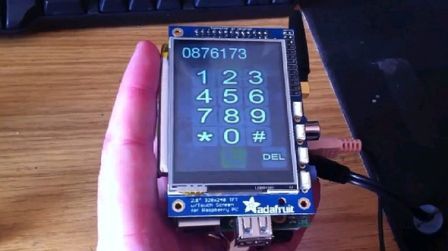Smartphones may represent the peak of mobile consumer technology, but with the convenient accessibility of computer parts like circuit boards from retailers as well as recyclable electronics, how hard could it be to build one? One particularly resourceful software engineer from Limerick, Ireland by the name of Dave Hunt has proved that the task is not particularly difficult with the right technical expertise and the right parts. By using a basic Raspberry Pi computer in conjunction with a selection of spare parts, Hunt built what he calls the “PiPhone” which proves that building a custom smartphone is both possible and affordable.
Hunt built the PiPhone from recyclable waste electronics and a few off-the-shelf components for whatever he couldn't scavenge. In total, Hunt built the phone for $158, which is cheaper than most retail prices on modern smartphones.
The PiPhone gets its name from the fact that it is based on the Raspberry Pi, which is a single-board computer that schools typically use to teach basic computer science. The Spartan device is made from little more than a circuit board, with extra sockets that allow a user to plug in a keyboard, monitor and Ethernet cable. The entire system is compressed into a single chip, which handles the graphics, memory, processing and calculation power for the Raspberry Pi. The Model B board, which Hunt used, also features a powerful 2500mAh battery and a 320x420 touch screen.

Image via Geek.com
Amazingly, Hunt was able to assemble the phone without having to solder anything together or having to rewire any of the electronics, which means that almost anyone could make the same phone with access to the right parts. The PiPhone is able to send and receive phone calls in addition to being a blank slate for apps to manually be programmed into the system.
The fact that this man was able to assemble a working smartphone from so little and without needing to engage in any complicated manufacturing processes means that carriers may no longer have a monopoly on selling the devices along with their own plans and limiting contracts. This also means that developing nations will be able to hop on board the smartphone train, since recycled electronics are in wide supply and can be easily shipped to the target countries. There, the local population could simply build their own phones, and enter the modern world of mobile electronics.
Edited by
Alisen Downey  QUICK LINKS
QUICK LINKS